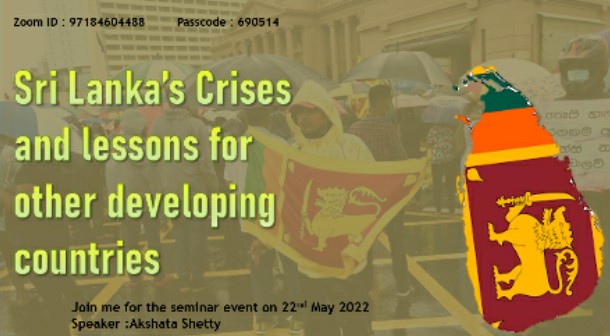We never miss an opportunity to address current events that our students should be aware of, so this time we scheduled a session on “Sri Lanka’s Crisis and Lessons for Other Developing Countries.”
Sri Lanka’s crisis and lessons for other developing countries. Many Developing Country goes through an economic crisis. There can be various reasons for the crises. But it does not occur suddenly. It is a result of years of policy and decision making. There are many signs that can predict if a country’s economy is moving in the right direction or not. This seminar is based on one such country; Sri Lanka. The Sri Lankan economy has been facing one of its worst ever economic crisis, resulting from mismanaged government finances and ill-timed tax cuts, besides the impact of the covid pandemic. Huge piles of foreign debt, series of lockdowns, soaring inflation, shortage in fuel supply, fall in foreign currency reserves and devaluation of currency has adversely impacted the country’s economic growth. Due to low foreign exchange reserves, the country is unable to pay for essential commodities and is hence enduring shortages of food, medicine, fertilizer, and fuel, with power outages lasting for over 13 hours. Moreover, one of the sweeping agricultural reforms was to make Sri Lanka’s agriculture organic, hence the ban on the import
of fertilizers in April 2021. This lowered the agriculture production to 50%. As a result, the country became more dependent on imports to sustain its population, weakening its currency against the dollar, and lowering its foreign reserves. Furthermore, Sri Lanka took a loan of $2.6 billion from the IMF. The guidelines from IMF to revive the economy stated instructions like increasing the taxes. However, the country did the exact opposite. It is also important to note that the Sri Lankan government implemented populist policies with the sole goal to win the election. While in the short term, the people were happy to save the money, it is not sustainable in the long run. Although Sri Lanka has faced a lot of issues since independence, there were times when they had chances to improve their economy, but their disastrous policy making hampered their growth in the long run and put them into a financial turmoil.
This seminar also sheds light on the importance of a diversified economy, and how focusing on only a few select sectors can have adverse effects. Also, focusing on improving the living standards of the population should be prioritized over new multi-billion-dollar projects. It also puts emphasis on the point that debt should always be kept at manageable level, the country should focus on fiscal and economic prudence, one should avoid new projects during economic crisis, control inflation with suitable policies, keep currency level stable, implement economic diversification, keep strategic reserves of essential goods. e.g., food, fuel, medicines etc. The first step what Sri-Lanka will have to do is to bring at least a temporary relief to their citizens by providing basic facilities like fuel and electricity. The IMF (International Monetary Fund) also will have to play a big role here. Sri-Lanka have already taken IMF’s help a whopping 15 times. Second only to Pakistan. Also, their existing loans will have to be restructured with proper discussions especially with China. So, without further loans Sri-Lanka will not be able to do anything.
About ISBR: ISBR Business School, Bangalore-based, Top Class B School for PGDM or MBA, Consistently ranked as best B School in India, AICTE-CII Platinum Category, with multiple specializations.

